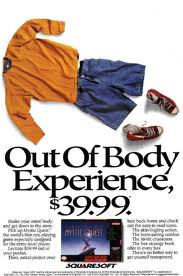By Chad Denton

Wasn’t the ad campaign for this game a horrible lie, even by the standards of ad campaigns?
Okay, okay, I’m going to come out and admit that it’s not fair to call Final Fantasy: Mystic Quest a bad game, not in a strict sense anyway. It set out to provide a basic, watered-down introduction to console RPGs and, honestly, it achieved that goal quite well. But at the same time it represented what was probably the most condescending message a company ever made to its own fanbase. Square was basically proclaiming to Americans, you all can’t handle our real product (which in this case would be Final Fantasy V) so we’re going to give you a version that’s more up to your speed – and that speed would be somewhere along the lines of a golf cart with a defective engine. Hell, when they released the game in Japan they even titled it Final Fantasy USA. Square might as well have subtitled it “This is what Americans think a RPG should be! Ha ha! They embarrass us by buying our games!”
Now I’m sure there were other elements to Square’s decision. Like the ad emphasizes, Final Fantasy: Mystic Quest was also cheaper, selling for $40 at a time when most RPGs for the Super Nintendo ran in the $50 – $60 range. But, trust me, you could see where you saved that money. The game didn’t even have its own graphical signature; most of the graphics were souped-up and colorized from Final Fantasy Legend III. You could also pretty much beat the entire game in a day or two of even casual playing, which was great if – like me – you made a habit out of renting video games and even RPGs for the weekend (P.S. I still curse the assholes who always erased my saved games when they rented the games before I could!), but not so good if you bought it expecting something like the 40 hour minimum players could expect to put into Final Fantasy IV.
Now I did say that technically it wasn’t a bad game. The plot was really simple – in some ways it was a rehash of the original Final Fantasy, including a premise about the world slowly dying because someone is messing around with the Four Crystals of the Elements, but without the time travel elements coming out of left field and with a villain seriously called the “Dark King” – but the designers did try to have a range of characters, even though you never have more than two people in your “party.” Also there’s actually a clever twist near the end where your hero finds out his status as the prerequisite “legendary chosen one” was based on a lie spread by the Dark King himself. Nothing really comes of it, but still it was an unexpected way to play with one of fantasy fiction’s oldest cliches. The gameplay was fun for what it was, and in a weird way, by having enemies visible on the screen rather than random encounters and having certain obstacles in dungeons that required the player to interact with the environment, Final Fantasy: Mystic Quest actually predicted certain features that are common in RPGs today, including Final Fantasy XIII.
